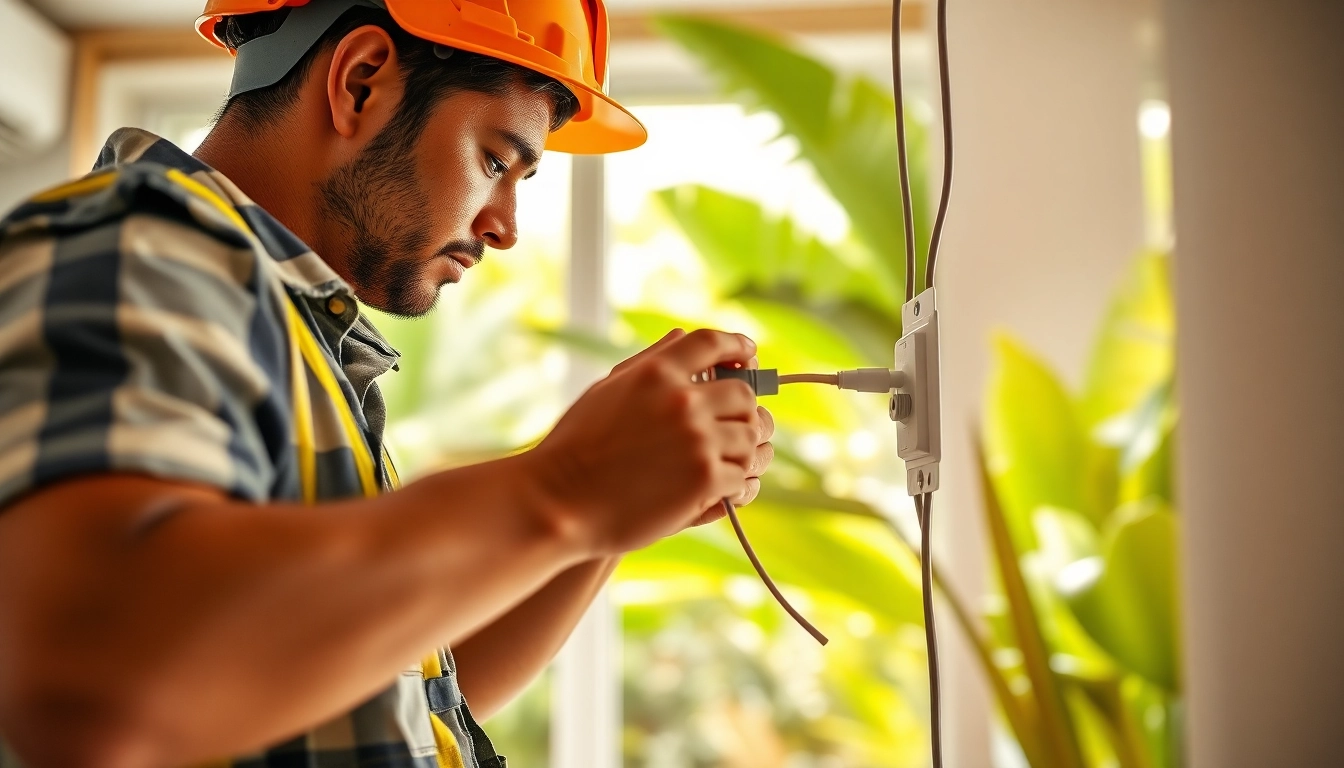
Understanding Electrician Apprenticeship in Hawaii
An electrician apprenticeship in Hawaii is a rigorous and rewarding pathway that blends hands-on training and classroom education, designed to equip aspiring electricians with both fundamental and advanced skills. This structured program is vital for those looking to establish a successful career in the electrical trade, allowing them to gain vital experience under the guidance of seasoned professionals. As individuals embark on this career journey, understanding the intricacies of how an apprenticeship works is crucial. This article delves into the nuances of electrician apprenticeships in Hawaii, starting with a clear definition of what an electrician apprenticeship encompasses.
What is an Electrician Apprenticeship?
At its core, an electrician apprenticeship is a structured training program, typically lasting four to five years, integrating both theoretical knowledge and practical experience. It prepares individuals to become skilled electricians who are capable of handling a range of electrical tasks, from installations to repairs, and everything in between. In Hawaii, these apprenticeships often combine on-the-job training with classroom instruction, allowing apprentices to learn about electrical codes, safety protocols, and advanced electrical systems. As apprentices progress, they are able to take on greater responsibilities, honing their expertise in specific areas, such as residential, commercial, or industrial electrical work.
Importance of Apprenticeships for Electricians
Electrician apprenticeships are crucial for several reasons. First and foremost, they offer a pathway to licensure in Hawaii, an important step for anyone looking to work professionally as an electrician. The training received during an apprenticeship ensures that individuals are well-equipped to meet the demands of the profession and navigate the complexities of electrical systems safely and efficiently. Moreover, apprenticeships foster mentorship, allowing aspiring electricians to learn directly from experienced journeymen and master electricians. This mentorship not only accelerates skill development but also provides invaluable networking opportunities, which can lead to job placements after completing the program.
Overview of the Electrician Apprenticeship Process
The process of becoming an electrician apprentice in Hawaii typically involves several key steps. Candidates must begin by researching available programs and understanding the specific requirements for each. Most apprenticeships require applicants to meet certain educational qualifications, such as a high school diploma or GED, and may also necessitate passing a basic math and reading test. Once accepted into a program, apprentices are required to complete a predetermined number of classroom hours alongside their on-the-job training hours. This balanced approach ensures that individuals are well-rounded in their understanding and application of electrical concepts, leading to better professional competence.
Requirements for Electrician Apprenticeship in Hawaii
Eligibility Criteria for Apprenticeship Programs
To qualify for an electrician apprenticeship in Hawaii, candidates generally need to meet specific eligibility criteria. This often includes being at least 18 years old, possessing a valid driver’s license, and having a high school diploma or equivalent. Some programs may have additional requirements, such as completion of specific pre-apprenticeship courses or vocational training. Additionally, certain physical capabilities may be necessary, as electricians often engage in strenuous tasks that require problem-solving and critical thinking skills.
Necessary Qualifications and Skills
Beyond the basic eligibility requirements, aspiring electricians should possess a set of skills and qualifications to succeed in their chosen path. Strong communication skills are essential for collaborating with clients, contractors, and team members. Basic mathematics, including algebra, is also critical, as electricians routinely perform calculations related to voltage, current, and electrical loads. Familiarity with tools and safety procedures is imperative, while a good understanding of technical documents like blueprints and schematics is beneficial.
Documentations Needed to Apply
Applying for an electrician apprenticeship typically requires several important documents. Candidates should prepare to submit proof of their age and education, such as a birth certificate or high school diploma. Additionally, most programs will require a completed application form, which may include personal references and evidence of previous relevant experience. Some apprenticeships may also request a resume outlining work history and skills, alongside a cover letter that expresses the applicant’s motivation for pursuing a career in the electrical field.
Finding the Right Electrician Apprenticeship Program in Hawaii
Top Programs and Institutions for Aspiring Electricians
Various institutions and organizations across Hawaii offer electrician apprenticeships. Programs may be hosted by trade unions, community colleges, or private companies. One notable organization is the electrician apprenticeship hawaii provided by ABC Hawaii, which combines classroom training with practical experience. Other local resources include the Hawaii Electricians Training Fund, which provides comprehensive training for new apprentices, and various other institutions that support career and technical workforce development.
How to Apply for Electrician Apprenticeship Positions
The application process for electrician apprenticeships can vary by program but generally follows a few common steps. Interested candidates should begin by researching various options to identify which programs best fit their career aspirations and qualifications. After selecting a program, applicants need to gather necessary documentation and complete the application process as outlined by the program provider. Important deadlines should be noted, and candidates may benefit from following up with the program coordinator to ensure their application is complete and to express their enthusiasm for the position.
Tips for Standing Out During the Application Process
To enhance their chances of securing a spot in a competitive apprenticeship program, candidates can adopt several strategies. First, highlighting relevant experience, even if it’s informal or in a different field, can demonstrate commitment and passion for becoming an electrician. Additionally, showcasing any completed pre-apprenticeship programs, relevant certifications, or technical coursework can differentiate applicants from others. Finally, preparing thoroughly for any interviews or assessment tests is vital, as showcasing confidence and competence can leave a lasting impression on hiring managers.
What to Expect During Your Electrician Apprenticeship
Training and Educational Components
The training received during an electrician apprenticeship encompasses a balanced combination of hands-on experience and classroom instruction. Apprentices can expect to learn about electrical theory, the National Electric Code, residential wiring, troubleshooting techniques, and a variety of electrical systems. Coursework is designed to be comprehensive, focusing on both the practical applications of electrical work and the theoretical underpinnings that inform it. Moreover, apprentices often undergo specialized training such as renewable energy technologies as part of the evolving educational landscape.
Workplace Environment and Safety Practices
Safety is paramount in any electrical working environment. Throughout their apprenticeship, individuals will engage in rigorous training focused on safety standards and best practices. Learning how to properly handle tools, use protective equipment, and follow industry regulations is imperative. Electricians are trained to recognize potential hazards, ensuring both their own safety and that of their colleagues and clients. As such, apprentices must grasp the importance of maintaining a safe working environment, fostering a culture of safety in their workplaces.
Mentorship and Support in Your Apprenticeship
Mentorship plays a crucial role in the success of an electrician apprenticeship. Apprentices typically work alongside experienced electricians who provide guidance, advice, and support. This relationship often extends beyond technical training, as mentors contribute to personal and professional growth, sharing insights from their own experiences in the field. Regular feedback, coupled with opportunities to ask questions, can significantly boost an apprentice’s confidence and competence. Additionally, many organizations promote peer learning among apprentices, creating a supportive learning environment that fosters collaboration and mutual growth.
Career Opportunities After Completing an Electrician Apprenticeship
Potential Job Roles and Responsibilities
Upon completing their apprenticeship, electricians can expect to find a variety of career opportunities waiting for them. Many apprentices progress to become journeyman electricians, responsible for executing electrical installations, repairs, and maintenance. Some may choose to specialize in specific areas, such as residential wiring, commercial installations, or industrial systems, while others may pursue roles in project management or electrical contracting. With advanced skills and experience, there is also the possibility of advancing to supervisory or management positions within electrical firms.
Salary Expectations for Electricians in Hawaii
The earning potential for electricians in Hawaii can vary based on experience, specialization, and location. According to various resources, entry-level electricians may start earning between $18 and $25 per hour. With several years of experience and the appropriate licensing, electricians can see their hourly wage increase significantly, with seasoned professionals earning upwards of $40 per hour or more, depending on the complexity of their work and their roles within a company. Additionally, electricians in specialized fields or management roles can expect higher compensation due to the demand for their skills.
Continuing Education and Advanced Certifications
Once an electrician has completed their apprenticeship, the journey does not end there. Continuing education plays a vital role in ensuring that professionals remain updated with the latest industry standards, technologies, and regulations. Many electricians pursue advanced certifications, such as those in renewable energy systems, advanced electrical technologies, or specialized safety training. Engaging in continuous learning not only enhances an electrician’s skill set but also improves job prospects in an ever-evolving job market, allowing for further career advancement and specialization.






